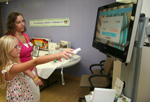|
|

|
Ozzie’s Project caters to isolated patients
|
by Leah Hyatt
Public Relations
Thanks to Ozzie’s Project, patients placed in isolation at MUSC
Children’s Hospital will have new opportunities to play and socialize
with others. Ozzie’s Project is a grant-funded program that gives
patients in isolation the necessary outlet of play and activity that
they would otherwise not have.
A hospital experience can be stressful for any child. Most young
patients at the Children’s Hospital have the opportunity to play and
socialize with other patients and family members at the Child Life
Atrium. Isolated patients, however, are restricted from those same
opportunities because of their diagnosis.
The YES Family Fund and the Volunteer Advisory Committee’s MUSC license
plate project both help fund Ozzie’s Project. This year, the YES
Allocation Committee awarded Ozzie’s Project with a $2,500 Family Fund
grant. The Volunteer Advisory Committee contributed $3,900 from sales
of the MUSC Children’s Hospital license plate.
 Ozzie's sister, Kristen Camilletti, 9, demonstrates how a Wii Fit game works to volunteer Emily Wallace. Ozzie's sister, Kristen Camilletti, 9, demonstrates how a Wii Fit game works to volunteer Emily Wallace.
Ozzie’s Project is named after a young patient with cystic fibrosis who
spent more than 150 days in isolation at MUSC during the last two years
of his life. Ozzie was a vibrant child who often wanted to play and
socialize, yet his isolation status prevented him from interacting with
others. This new program will use technology and other resources to
help normalize the hospital experience.
These funds have purchased laptops, a Sony Wii video game system, and
items for Ozzie’s Closet. “Ozzie’s Closet provides nurses with
age-appropriate play items to give to children upon admission to the
Children’s Hospital when they are placed on isolation,” said Tara
Sampson, a child life specialist and atrium coordinator. Ozzie’s Closet
includes items such as Barbie dolls, Transformers figures, iTunes gift
cards, travel size games and toddler toys.
The laptops purchased for Ozzie’s Project connect to the Internet so
that pediatric patients can stay in touch with friends and family at
home and have built-in Web cams that enable them to communicate and
interact with other patients despite being in isolation. “They provide
us with the ability to virtually include isolation patients in support
groups and Atrium activities, which has previously been impossible,”
explained Sampson.
The Wii system purchased for Ozzie’s Project will allow patients in
isolation to participate in physical activities while within the
confines of their hospital room.
Ozzie’s Project also includes individualized therapeutic resources,
which are resources unique to the coping needs of isolated patients.
“These resources could include a cooking project with a patient’s
favorite food, a particular book or movie, sensory stimulation for the
younger children, or anything else that would meet their current coping
needs,” said Sampson. “This allows us to provide play opportunities so
crucial for patients coping in the hospital environment, especially
when these children are confined to their room.”
“Ozzie’s Project is charged with improving the hospital experience of
children in isolation through play outlets, educational resources,
individualized therapeutic resources, and virtual socialization,” added
Sampson.
To purchase a Children’s Hospital license plate and help support Ozzie’s Project, visit http://musckids.com/news/license_plate.htm or visit a local Department of Motor Vehicle office.
Friday, Aug. 14, 2009
|
|
|



